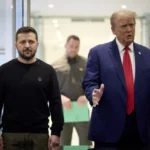Mahmoud Khalil’s arrest, In a move that has ignited debates over free speech and national security, President Donald Trump has declared the arrest of Palestinian activist Mahmoud Khalil as “the first of many to come,” signaling a broader crackdown on campus activism perceived as anti-American or supportive of terrorist organizations.
Arrest of Mahmoud Khalil
Mahmoud Khalil, a Syrian-born graduate of Columbia University’s School of International and Public Affairs, was detained by U.S. Immigration and Customs Enforcement (ICE) on March 8, 2025. Despite holding permanent resident status, agents arrested him at his university housing. His eight-months-pregnant American wife was also present and threatened with arrest.
ICE officials claim Khalil’s activities were linked to Hamas, a designated terrorist organization. His arrest follows a January executive order by President Trump. The order aims to combat discrimination against Jewish students by targeting pro-Hamas supporters.
Legal Proceedings and Reactions
A federal judge has temporarily blocked Khalil’s deportation, leading to widespread concerns over potential infringements on free speech and campus activism. Civil liberties advocates argue that the administration’s actions could suppress legitimate political expression.
Protests have erupted in New York City, with demonstrators accusing the administration of stifling pro-Palestinian activism. Columbia University has faced federal funding cuts, citing inaction against harassment of Jewish students.
Administration’s Stance
President Trump has been vocal about his administration’s intolerance for what he describes as pro-terrorist, antisemitic, and anti-American activities on university campuses. He emphasized that Khalil’s arrest is part of a broader nationwide effort to address such issues.
Implications for Campus Activism
The arrest has heightened anxiety among international students and activists, who fear retaliation for political expression. Columbia University, known for its liberal stance on protests, now faces backlash as petitions calling for Khalil’s release gain substantial support.
This development underscores the escalating tensions within academic institutions amid governmental crackdowns on dissent, raising critical questions about the balance between national security and the protection of civil liberties.


